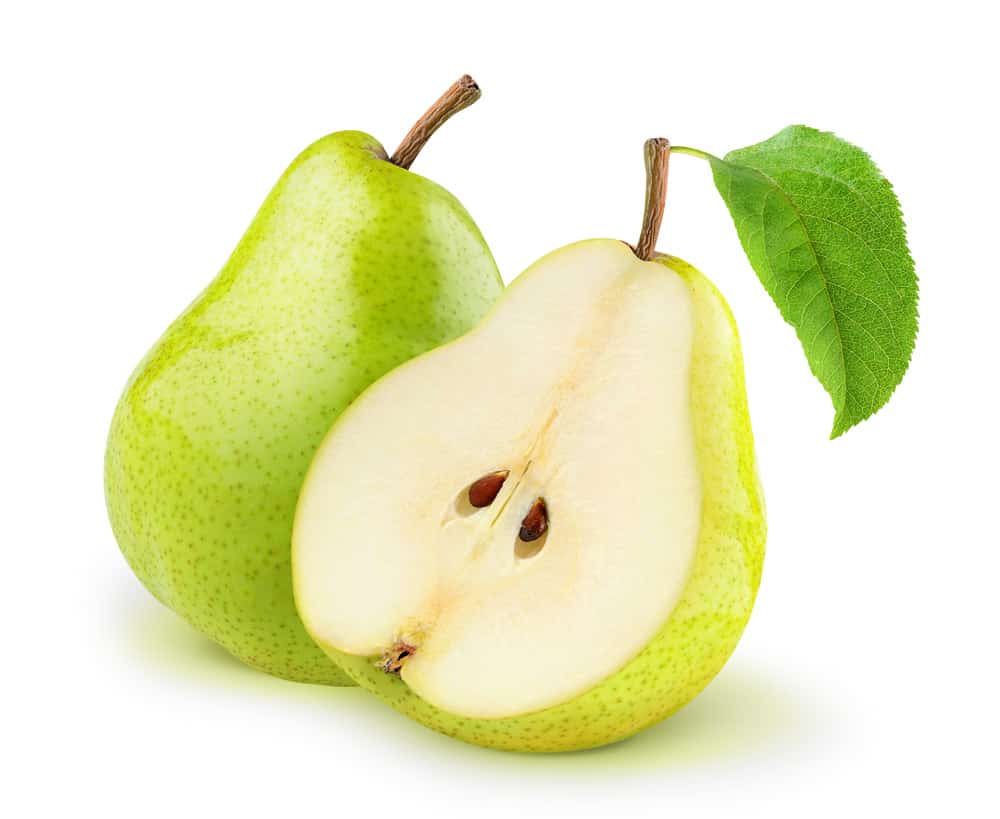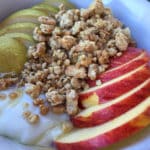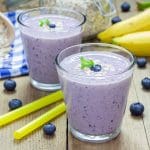Pear Facts:

Nutrition Facts
Serving Size 1 Medium
Servings Per Container 1
Amount Per Serving
Calories 103
Calories from Fat 0
% Daily Value*
Total Fat 0g
0%
Saturated Fat 0g
0%
Trans Fat 0g
Cholesterol 0mg
0%
Sodium 2mg
0%
Total Carbohydrate 28g
9%
Dietary Fiber 6g
24%
Sugars 17g
Protein 1g
Vitamin A
1%
Vitamin C
12%
Calcium
2%
Iron
2%
Vitamin E
1%
Vitamin K
10%
Thiamin
1%
Riboflavin
3%
Niacin
1%
Vitamin B6
2%
Folate
3%
Pantothenic Acid
1%
Magnesium
3%
Phosphorus
2%
Potassium
6%
Zinc
1%
Copper
7%
Manganese
4%
*Percent Daily Values are based on a 2,000 calorie diet. Your daily values may be higher or lower depending on your calorie needs.
PQ (Protein Quality) x PDCAAS (Protein Digestibility Corrected Amino Acid Score) - 22
Additional Contents
- lutein
- flavonoids
- zeaxanthin
- carotenoids
- phytosterols
- beta-carotene
- cinnamic acid
- beta-cryptoxanthin
- hydroxybenzoic acids
- hydroxycinnamic acids
- complex carbohydrates
Potential Health Benefits
- lower cancer risk
- energy boost
- antioxidant boost
- anti-inflammatory
- help lower cholesterol
Potential Athletic Benefits
- Complex carbohydrate source for pre/post-workout energy.
- Anti-inflammatory properties lower recovery times between workout days.
- Slow & sustained energy release due to the fiber content of the skin.
Glycemic Index Rank
36 out of 100
| Rank | Value |
|---|---|
| Low Glycemic | less than 55 |
Food Sensitivity Rank
2.3 to 1 ratio
| Rank | Value |
|---|---|
| High for Fructose Sensitivity | more than 1 (fructose to glucose ratio) |
Pears are one of the top sources for dietary fiber. They are also great sources for complex carbohydrates. With these two major qualities combined, this provides a slow and steady release of energy into the blood stream from the digestive tract. Pears also contain high levels of phyto-nutrients and anti-cancer properties making them very attractive to consume regularly.
- Dietary Flavonoid Intakes and Risk of Type 2 Diabetes
- Anti-Cancer Agents Derived From Natural Cinnamic Acids
- Cinnamic Acid Derivatives as Antioxidant and Anti-Cancer Agents
- Academy of Nutrition and Dietetics: Health Implications of Dietary Fiber
- Hydroxybenzoic Acids and Their Derivatives as Peroxynitrite Scavengers

565kcal/serving

Dietary Fiber
Present in plant foods, is metabolically processed to enhance bowel health. Dietary fiber can combine with bile acids, which are primarily comprised of cholesterol, that then help with their elimination. Fiber is never absorbed by the body, rather it acts as a major contributor to healthy digestion and clearances of unwanted high levels of toxins and cholesterol.
Sources include: USDA
***All-Body Fitness takes no responsibility for the accuracy of the information provided above. Please contact a medical doctor or a registered dietitian for nutrition advice.



